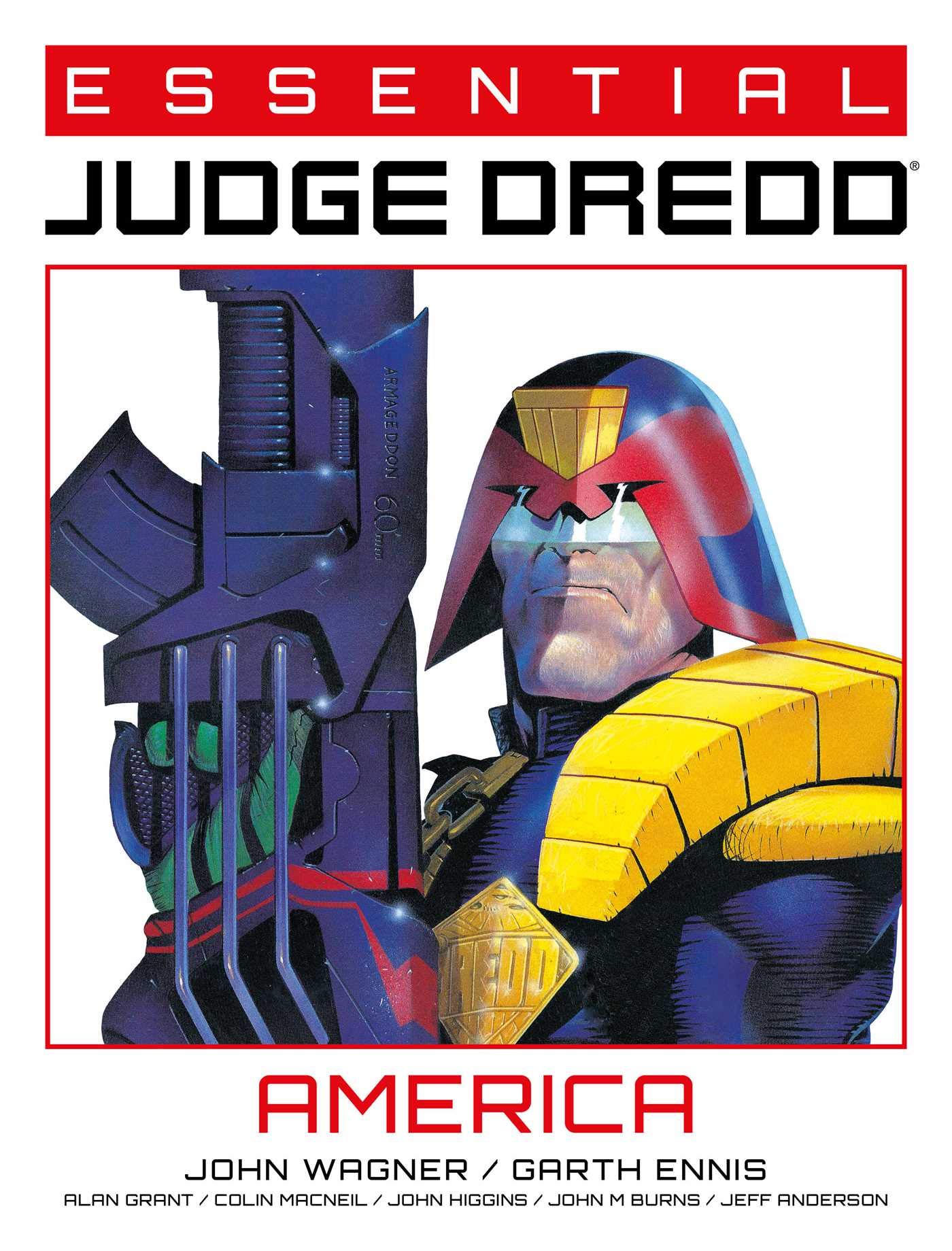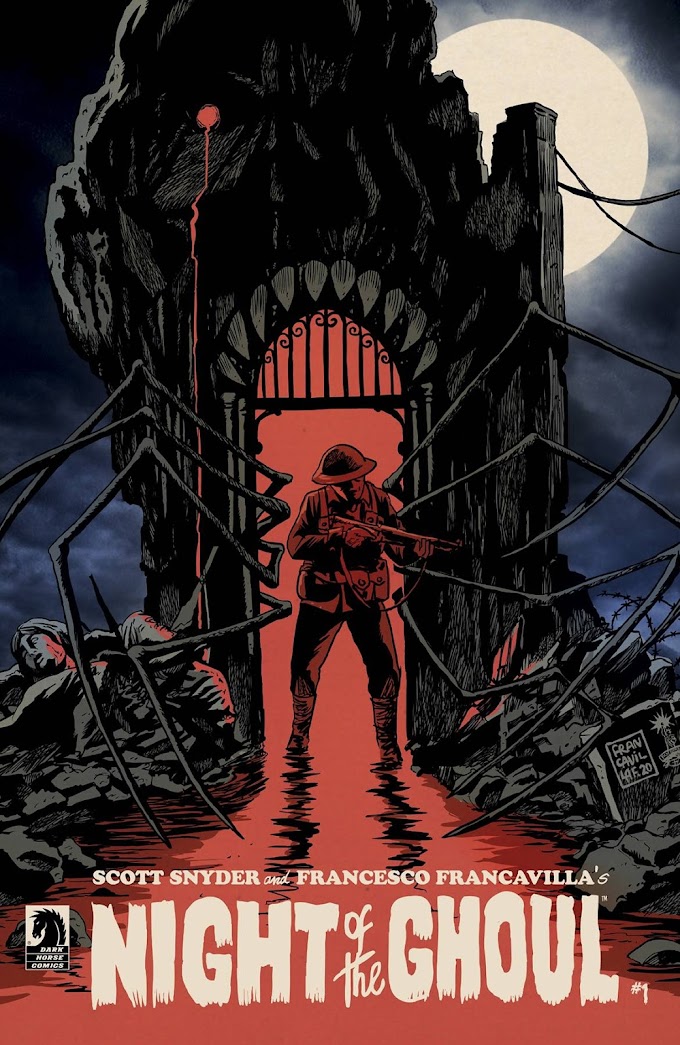
Rebellion has been working diligently to find ways to make 2000 AD and Judge Dredd accessible to more audiences. Like any long-running superhero property, jumping into Dredd can be a little intimidating. But new collections like this provide the proper dose of backstory and relevance to make the waters equally inviting and rewarding.
That level of trepidation likely increases for American audiences due in some small part to little more than a rudimentary familiarity with the character from his two films or the various American adaptations and crossovers from DC or IDW. Add to that the fact that Dredd’s adventures, unlike American capes, are chronicled in an anthology publication that has never seen need to reboot or relaunch its flagship hero. Ironically enough, 2000 AD provides and advertises ample jumping on points, but the potential reader needs to already be engaged enough in that world to pick it up. The way progs hit American shores, in polybagged monthly packs of four nearly thirty days after original UK publication, doesn’t aid American buy-in either. 2000 AD also operates their own web store and digital app, so you’re not going to find these books in a great ComiXology sale any time soon.
But, someone at 2000 AD has been thinking, grinding away at different initiatives to bring in new readers on both sides of the pond.
Cue this new release of Essential Judge Dredd: America. This publication is a wise choice; uncanny in its relevance to current American culture, and connected by theme and content compared with the traditional chronological account of Dredd and the judges.
Essential Judge Dredd: America features a set of stories united by a theme of uprising against the fascistic control of the Judges and the Justice Division.
I told you this collection was dripping with relevance.
The first story, “Letter from a Democrat,” is this edition’s oldest, and it sets the tone for the stories to follow as well as tying into future events. John Wagner and John Higgins combine for a late 80s Dredd story, initially a one off, focusing on a now-widowed Gort reading the love letter - what amounts to a dying declaration - from his wife Hester, penned before she executed an uprising against the Judges in the name of democracy. Hester had what would prove to be a very accurate assumption that the mission would leave her martyred, and what we receive as readers is a vision of her distinct from the woman Gort might have known. Wagner and Higgins intersperse the letter into scenes of Hester and her band of rebels, The Democratic Tendency, as they take over a morning news show and attempt to ignite a democractic revolution. The letter is Hester’s rationale for joining a mission that will almost certainly end in death. By the end, we know her fate was all but predetermined, and one can’t help but weigh her choices and decisions, especially as the story closes on Gort and their children.
“Letter from a Democrat” is a poignant choice to start this collection because it establishes the status quo for Mega City One very quickly. If the goal of this type of collection is to put an accessible set of stories in the hands of newer readers, then this is exactly the type of story that gives readers enough of an overview without being necessarily didactic. That the story stems from a late 80s prog and has likely only grown with its relevance almost thirty-five years later is rather disconcerting. Judge Dredd and 2000 AD debuted a few short years before the ascendancy of Margaret Thatcher to the British Prime Minister role, and, while Dredd was always conceived as a brutal emblem of state justice, I can’t help but think the character and the nuance of his role only grew concurrently with Thatcherism.
There is something about distance that provides for stronger satire. It provides both reflective dissection and polemic. The most commonly cited example of this phenomenon is the television show, MASH, which used its setting of the Korean War to discuss the Vietnam War while ultimately commenting on the nature of war as a whole. Judge Dredd, set in post-apocalyptic America, in the morphed and mutated eastern seaboard now known as Mega-City One, provides a similar mode of commentary, taking both Thatcherism and Reaganism, both hell bent on upending the previous generations strides, immersed in Cold War domestic and foreign policy, and barreling towards the divided culture of late-Capitalism, shows us both what we have been as well as what we can become.
The concentration in Essential Judge Dredd: America focuses on the notion of democracy, specifically who deserves it. In the eyes of the Judges, no one does. Dredd himself utters the line, “Democracy’s not for the people.” Both movies and many of the American comic adaptations have cast Dredd in a more heroic light, and it’s certainly fair to say that even with my limited knowledge of his history that he has ebbed and flowed in this regard. But in this collection, he is clearly the villain, the face of the Justice Authority as they quell any attempts at an uprising.
Running through the stories that follow “Letter from a Democrat” is not only the current of authority, but also one of manipulation. The Justice Authority purports a need to squash democracy because people cannot be trusted with it. Mega-City-One is too large, it’s population too stratified and out of touch to be able to rule themselves. Such a notion is all too familiar in Western politics today, and it is a hallmark of right-populism, some convoluted philosophy that the best path towards freedom and safety is to trust in a ruler. Inherently divisive, it pits neighbor against neighbor, thereby retroactively justifying initial fears and sowing further discord. Preventing unity while assuring trust in the system provides the lifeblood for such an engine, and manipulating the narrative only further tightens that grip on power.

The crucial lesson of Essential Judge Dredd: America is that each attempt at a revolution allows the Justice Authority to increase its dominance and pressure on the average citizen. Dredd and the Judges manipulate friendships and stories, realizing the game is as much about optics as it is physical control. There is a promotional, public relations aspect to their policing. The heart of the follow up to “Letter from a Democrat,” “Revolution” sees the revival of the Democractic Tendency. Rather than simply smashing the demonstration, the Judges pick apart the organizers to discredit them to both the general public and their supporters before inciting a riot that justifies their force. In Revolution, they stage a mock-terrorist attack. In America, they manipulate a rekindled friendship and set up an ambush during a demonstration.
Because where a man would be weak, a judge would be strong. Where a man would fool himself that millions of people could live together in peace, a judge would know that that was just a pipedream, and that iron-fisted law was needed to stop murderous chaos. - Garth Ennis, "Twilight's Last Gleaming," the story that closes the collection and offers the best look at how Dredd maintains the status quo even in moments of doubt.
These stories, thirty years old, produced by British writers and artists, are hauntingly prescient. And while the narratives themselves are reason enough to engage with this collection, getting a chance to enjoy this specific style of art is an equal draw. American books don't look like 2000 AD. Early Vertigo, with its reliance on British writers, also imported a dose of the aesthetic, but it's ultimately a style of its own, deliberate and heavy, a bridge between Bronze and Modern grittiness, but devoid of the unintentionally ironic bombast of 90s American books. John Higgins, who illustrates the first two chapters of the collection and who re-colored much of the works has a great style for 2000 AD newbies. He has the type of art that you immediately recognize as older, but one that still maintains a freshness of execution. He alternates between crisp, clean lines with darkly shaded and heavily detailed panels. I don't know if there is a house style, per se, but Higgins work assuredly marks a style consistent with Judge Dredd. There is a logical unity between Dredd's writers and artists, as the nature of the setting and the look of the Judges in relation to their citizens personifies the divide in Mega-City-One. This collection fundamentally works because it opens the door to Judge Dredd via a poignant selection of stories that capture the zeitgeist, be it a desperate cultural ennui or an agitated fear.
Essential Judge Dredd: America features the work of a number of creators. Primarily featuring writing from John Wagner alongside Alan Grant and Garth Ennis, it also features the art of Colin MacNeil, John Higgins, John Burns, and Jeff Anderson.





![Sweat and Soap [Ase to Sekken] by Kintetsu Yamada](https://blogger.googleusercontent.com/img/b/R29vZ2xl/AVvXsEgMnQltxjWqGS1_duhCp9Er1a0NbALuSFrqvjaV4_PjN_w67xCGghYt-l0qKyqTH7Ei7gbq_mxVq8aPAuOiyaArwAMLJWhpGmOYaARUBnwvjmv2-ZIe20m_zR5CvKnPdI6US_AuOnmi3gSX/w680/57525895-BA7E-4EF8-9FE4-89F9C164E1A4.jpeg)

